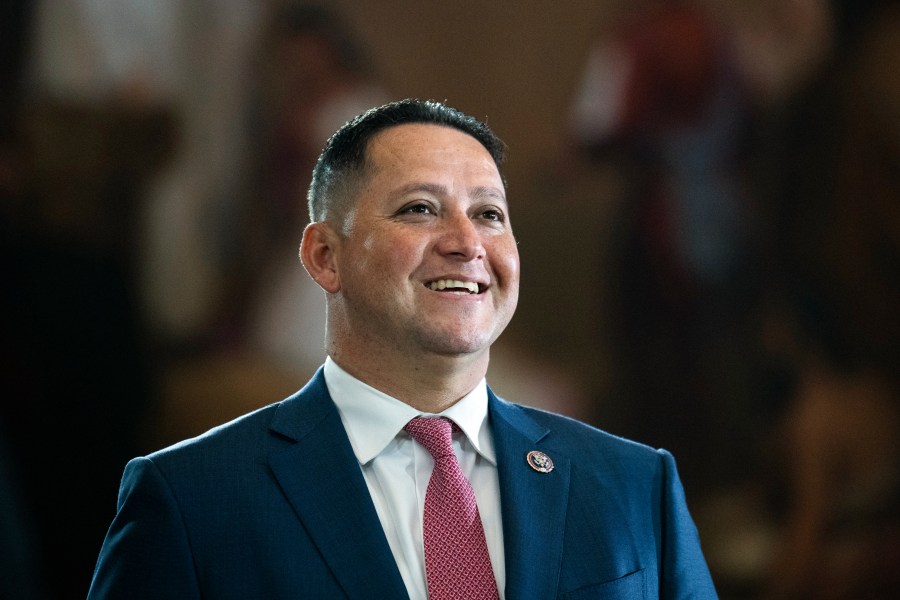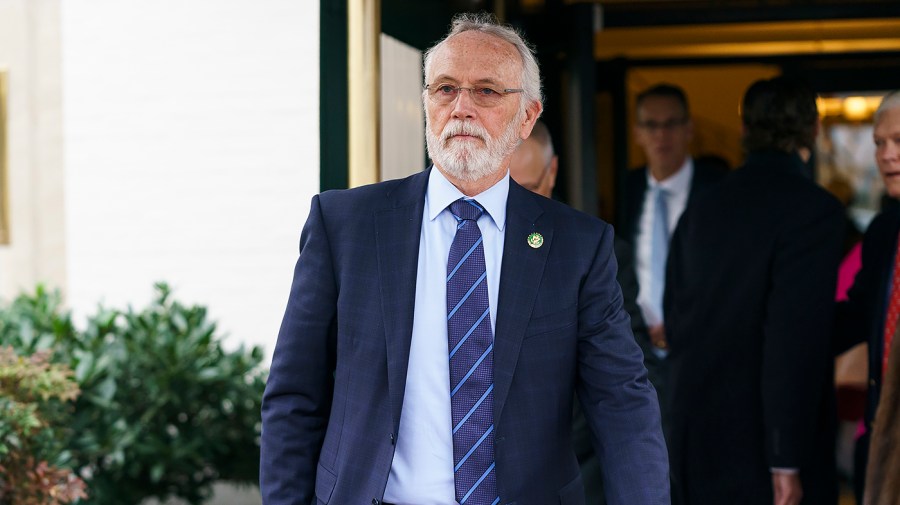How the GOP overcame infighting and passed its border bill
House Republicans fulfilled a major campaign promise this week with the passage of a border security crackdown measure — given the designation of H.R. 2 to symbolize its significance — that boosts border technology and funding, restarts border wall construction, adds new restrictions on asylum seekers and more.
But they did so only after months of public swipes, late-stage delays and last-minute changes.
“You also saw the disagreements, some of them publicly, where members have strong opinions on different approaches,” House Majority Leader Steve Scalise (R-La.) said. “And frankly, that’s why Congress hasn’t been able to pass a strong border security bill over the years, including when Donald Trump was president.”
Not much has been simple for the slim House GOP majority this year, even passing their top priorities. Thursday’s passage of the Secure the Border Act, which is dead on arrival in the Democratic-controlled Senate, adds to a pattern of House Republicans overcoming public infighting and sometimes surprising critics — from the drawn-out saga to elect Speaker Kevin McCarthy (R-Calif.) to a recent late-night scramble over a GOP debt ceiling bill.
Some of those involved in pulling the bill over the finish line say the process really started last year, when getting almost all Texas House Republicans behind a border framework laid the groundwork for getting almost the entire conference — sans two Republicans — to vote for H.R.2 on the floor.
“It was a central feature of getting where we needed to go to get this accomplished – no question,” said Rep. Chip Roy (R-Texas), insisting that the entire conference agreed on 95 percent of what was in the final bill.
Public swipes

Rep. Tony Gonzales, R-Texas, is seen before the flag-draped casket bearing the remains of Hershel W. “Woody” Williams lies in honor in the U.S. Capitol, July 14, 2022, in Washington. (Tom Williams/Pool photo via AP, File)
Scalise announced at the start of the session that the GOP would fast-track a bill from Roy, H.R. 29, directing the government to deny entry to most undocumented migrants unless it has capacity to detain them or place them in a program where they’re returned to Mexico.
But that bill never came to the floor in the face of strong opposition, even as leaders began incorporating it into the larger GOP package.
Rep. Tony Gonzales, the only Texas Republican who did not sign on to the Texas border plan, waged a public war against the bill, calling it “un-Christian” and “anti-immigrant” and vowing that the larger GOP border bill would fail on the floor if Roy’s bill was included. At one point he even threatened to vote against the party’s debt ceiling bill.
The two spent much of April sparring publicly over the bill, but when the bill was unveiled at the end of that month, some of the stronger language regarding the entry of migrants had been adjusted in committee — and to Gonzales, that was a victory.
“I give a lot of credit to the Hispanic Conference for sticking together,” Gonzales said. “Leadership’s strategy has been to try to put people on an island. And it was very clear that I wasn’t an island. I was an iceberg, and I think there were a whole lot of other members underneath me.”
In the end, Rep. Mario Diaz-Balart (R-Fla.), who is a co-chair of the GOP Congressional Hispanic Conference along with Gonzales, was the lead sponsor of H.R. 2.
Roy noted, however, that much of his bill did make it in the final legislation. It did not matter that his name was not on the final product, he said.
“I only share that not to defend the [H.R. 29] bill – I don’t give a shit. I cannot overstate the extent to which I do not give a shit. What I do give a shit about is policy. And at the end of the day, we got the policy that we wanted that we had put forth in H.R. 29,” Roy said.
Last-minute delays and changes

Rep. Dan Newhouse (R-Wash.) leaves a closed-door House Republican Conference meeting at the Capitol Hill Club in Washington, D.C., on Wednesday, January 25, 2023.
As members of the Hispanic Conference came around to support the bill, it hit snags with agriculture-focused moderates.
Members such as Reps. David Valadao (R-Calif.) and Dan Newhouse (R-Wash.) worried about the impact a provision to mandate employers use E-Verify, the government system that checks whether an individual is authorized to work in the U.S., would have on the ag industry.
For those members, it was important that any changes to E-Verify were accompanied by reforms to the H-2A temporary agricultural worker visa program — changes that were not in the bill. Newhouse has long worked on that issue with his Farm Workforce Modernization Act.
Those members struck a deal with leadership to amend the bill in the House Rules Committee — the last stop before the House floor — with language that directs the Homeland Security Secretary to consider the adverse impacts of mandating E-Verify before implementing it.
But the Rules Committee passed the bill after midnight without any changes, surprising the lawmakers. People familiar with the holdup said hardline conservative members did not want to amend the bill at such a late stage.
A bigger issue was brewing on the other ideological side of the conference.
Rep. Dan Crenshaw (R-Texas), who had said the bill did not do enough to combat drug cartels, sounded the alarm about many Republicans taking issue with the bill over a section that directs a study on whether drug cartels should be designated as a foreign terrorist organizations.
House Majority Whip Tom Emmer (R-Minn.) started getting text messages about people concerned with that foreign terrorist organization language just a few days before the vote, with members saying to move them to a “lean no” on the bill.
What started as an issue for a handful of people quickly grew to a group of about 40 members as members sent word around to each other, Emmer said.
“It took probably a half an hour, 45 minutes to get everybody narrowed down to what they were really upset about,” Emmer said. He called the late negotiations the “live exercise stage, much like the debt ceiling” bill a few weeks ago.
The crux of the issue, Emmer said, was that members did not want to give any more authority to Homeland Security Secretary Alejandro Mayorkas — even for a study.
The fix for both the E-Verify issue and the cartel issue came in a floor amendment.
Instead of DHS leading the charge, Congress would commission a report evaluating a national security strategy for the U.S. regarding cartels. Crenshaw on Friday also announced that McCarthy assigned him to lead a task force that will focus on how to combat drug cartels, after he met with the Speaker to extensively discuss the issue.
New “sense of Congress” language also dictated that, in enacting the E-Verify requirement, the Department of Homeland Security (DHS) must ensure “any adverse impact on the nation’s agricultural workforce operations and food security are considered and addressed.”
Newhouse took to the House floor ahead of the bill’s passage on Thursday to seek a commitment from leadership that work will continue on reforming H2-A agricultural worker visas. Scalise on the floor vowed that leadership will continue to work with him “to address the workforce needs of our agricultural industry.”
Some moderates were also making their own consideration on E-Verify. They realized the bill has virtually no shot at becoming law, and voting against a border security measure would be politically painful.
Emmer called the bill’s passage “nothing short of historic from a legislative perspective,” because of getting the most moderate members and the most conservative members to support it.
“I didn’t feel that quote-unquote, drama,” Emmer said. “Drama to me is, you know, going to the floor and trying to figure out if you got the votes. We knew what every single vote was.”
Copyright 2024 Nexstar Media Inc. All rights reserved. This material may not be published, broadcast, rewritten, or redistributed..











